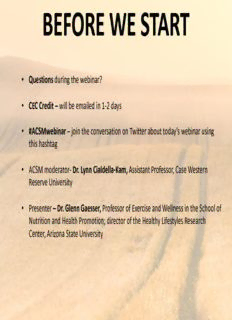
intensity exercise PDF
Preview intensity exercise
BEFORE WE START • Questions during the webinar? • CEC Credit – will be emailed in 1-2 days • #ACSMwebinar – join the conversation on Twitter about today’s webinar using this hashtag • ACSM moderator- Dr. Lynn Cialdella-Kam, Assistant Professor, Case Western Reserve University • Presenter – Dr. Glenn Gaesser, Professor of Exercise and Wellness in the School of Nutrition and Health Promotion; director of the Healthy Lifestyles Research Center, Arizona State University Carbohydrates, Performance & Weight Loss: Is low the way to go, or the way to bonk? ACSM Webinar February 15, 2017 Glenn Gaesser, PhD School of Nutrition and Health Promotion Arizona State University [email protected] Disclosure Glenn Gaesser is a member of the Scientific Advisory Board of the Wheat Foods Council, which is sponsoring this presentation Learning Objectives Participants will be able to: • Advise clients on the optimal amount of carbohydrates to recommend for performance or weight loss • Accurately explain why or why not a low-carbohydrate approach is appropriate for athletes or others • Discuss the research on carbohydrate metabolism and health, weight, and chronic disease and its impact on public health recommendations for carbohydrate intake Is a low-carbohydrate diet better for weight loss? Energy imbalance is necessary for weight loss Calories expended must exceed calories eaten For fat loss, fat calories expended must exceed fat calories eaten Relationship Between Carbohydrate Intake and Body Mass Index – Cohort Studies 28 NHANES (men) 27 NHANES (women) x e d 26 CSFII (men) n I s CSFII (women) s a 25 M BLSA y d 24 o WHS B NHS I 23 NHS II 22 HPFS 25 35 45 55 65 Canadian NBSS Carbohydrate (% of total) Gaesser. JADA 2007; 107:1768-1780 Virtually all prospective cohort studies show an inverse relationship between carbohydrate intake and body mass index Body weight difference between high- and low-carbohydrate intake groups is approximately 5-7 pounds Gaesser, JADA, 2007; 107: 1768-1780 JAMA, 2014;312(9):923-933 Low Carb vs. Low Fat: No Difference in Weight Loss at 6 and 12 Months Johnston et al, JAMA, 2014;312(9):923-933
Description: